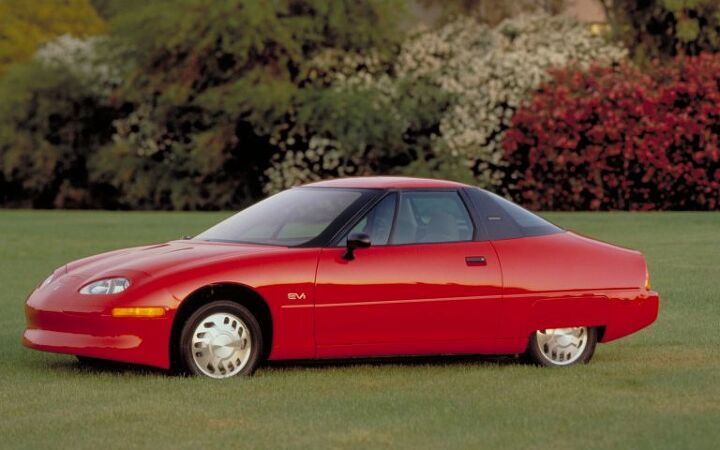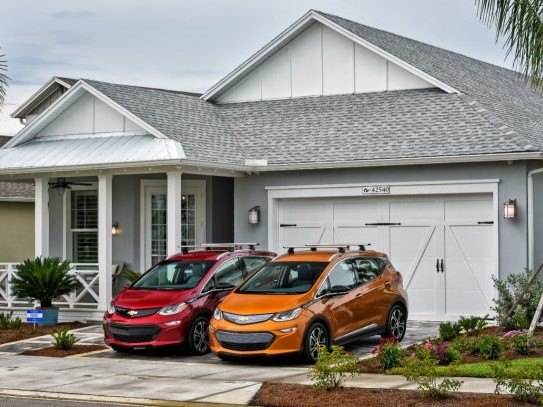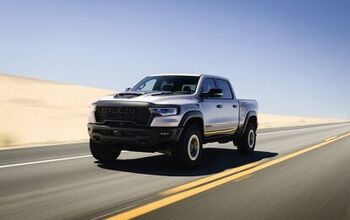General Motors: Electrification Will Take 'Years and Decades'

Since the dawn of the new century, the automotive industry has been forced to revise electrification timelines for a cavalcade of reasons. Development programs have proven costly, the economy has taken a turn (or turns) for the worse, customers haven’t responded in great numbers, and the materials necessary for battery have been in short supply for many. Throw in the trouble some companies have had with programming such cars or ending up with electric vehicles that want for truly enviable range and you’re beginning to see the whole, problematic enchilada.
It wasn’t all that long ago that General Motors promised over 20 new all-electric models by 2023. Granted, this promise was made in 2017 — during a time when the industry couldn’t possibly have foreseen the global hardships that would befall us or known we’d have the ability to remember what was said just a few years prior. The messaging has changed, either because mainstream automakers cannot provide the kind of cars that will continue to spur EV adoption, or because they no longer hold much interest in trying.
In a way, we feel kind of sorry for the industry. Environmental regulations forced the electrification issue to a point where most players had to at least indicate they had a serious interest in the technology. But only Tesla seems to have made any legitimate headway with customers, creating a strong base thanks to top-tier branding and simply being the first team to deliver an enviable electric car.
“We believe the transition will happen over time,” General Motors CEO Mary Barra told David Rubenstein in an interview on Bloomberg Television. While she still has faith in an all-electric future and noted that GM has a new battery platform coming out soon, Barra said the company needs to “provide options for the entire market place.”
She then went on to say how excited she was about the transition to electric vehicles, which no longer appears to be taking place within her lifetime. When asked if GM will swap to producing EVs exclusively in 10 to 20 years, Barra suggested it would likely take longer than that.
“I think it’ll happen over a period of years and decades. When you look at the transition that needs to occur, there’s about 250 million U.S. cars in the car park. And so, transitioning all of them is going to take some time. You think about different use cases, also affordability. That’s why we’re working to hard to ensure we’re in a leadership position with battery technology — so EVs are affordable for everyone.”
Surely, that’s also why GM is building the Hummer EV — a vehicle that spits in the face of efficiency and affordability while still being entirely electric. Barra mentioned the upcoming model briefly in the interview, glossing over its status as an all-electric plaything for people who want to drive a miniature monster truck while still feeling like they’re saving the environment. She also didn’t harp on its delayed arrival. That doesn’t mean it won’t be great when it does debut; it just doesn’t seem to represent the corporate ideals GM would like to convey to the public.
From Bloomberg:
In addition to funding its EV program, GM also is spending about $1 billion a year to fund Cruise LLC, the self-driving car unit the Detroit-based carmaker majority owns. A return on that investment will bear fruit before long, Barra said. Although Cruise canceled plans to launch a ride-hailing service last year and has not set a new date, it is developing a self-driving vehicle that will be dedicated to a robotaxi service.
“I definitely think it will happen within next five years,” she said of of fully driverless cars being deployed. “Our Cruise team is continuing to develop technology so it’s safer than human driver. I think you’ll see it clearly within five years.”
Cruise’s first autonomous vehicle was supposed to be ready for GM’s uses by 2019, sans steering wheel and pedals. Unfortunately, development woes that were hardly exclusive to America’s largest automaker made that impossible. Bloomberg also failed to mention the manufacturer cut autonomous development staffers by roughly 8 percent this year.
We have even less faith in AVs than we do EVs, the latter of which seem to be hung up by logistical issues and rapidly advancing technology. Vehicular autonomy appears to have stagnated entirely, with many automakers allocating less resources to programs after hitting R&D roadblocks. Legal gray areas surrounding liability also plague the concept. However, the industry is still keen to rework cars so you can spend less time driving and more time interfacing with in-car displays that are perpetually connected to the internet — an idea we’re not overly fond of.
Shifting back to EVs, there’s little chance the General will hit its old target and saturate the market with EVs by 2023. It definitely has several moving up the spreadsheet toward production, with large electric models presumably coming to GMC and Cadillac in 2021. But that leaves the company releasing over a dozen other battery driven vehicles (or plug-in hybrids) on a tight timeline.
We don’t foresee any automaker that isn’t Tesla cornering the green market for the next few years. Most manufacturers have already overshot the metaphorical landing zone and seem to be going around for another attempt. Others have come dangerously close to crashing on the runway. GM’s in a tough spot, though we figure its base doesn’t care one whit what it’s doing in terms of green vehicles. They’ll happily continue buying affordable family transportation from the company, mainly in the guise of pickups and crossover vehicles.
[Images: General Motors]

A staunch consumer advocate tracking industry trends and regulation. Before joining TTAC, Matt spent a decade working for marketing and research firms based in NYC. Clients included several of the world’s largest automakers, global tire brands, and aftermarket part suppliers. Dissatisfied with the corporate world and resentful of having to wear suits everyday, he pivoted to writing about cars. Since then, that man has become an ardent supporter of the right-to-repair movement, been interviewed on the auto industry by national radio broadcasts, driven more rental cars than anyone ever should, participated in amateur rallying events, and received the requisite minimum training as sanctioned by the SCCA. Handy with a wrench, Matt grew up surrounded by Detroit auto workers and managed to get a pizza delivery job before he was legally eligible. He later found himself driving box trucks through Manhattan, guaranteeing future sympathy for actual truckers. He continues to conduct research pertaining to the automotive sector as an independent contractor and has since moved back to his native Michigan, closer to where the cars are born. A contrarian, Matt claims to prefer understeer — stating that front and all-wheel drive vehicles cater best to his driving style.
More by Matt Posky
Latest Car Reviews
Read moreLatest Product Reviews
Read moreRecent Comments
- Bd2 The "e" nomenclature signifies the e-ATPs which BMW is pursuing.
- Dave M. I'm sorry to see any storied name go away. The lifespan of the Malibu has fit perfectly in my lifetime years-wise. Some of the highlights include the first and second generations, the '78 revamp (very clean design), and the 2005 generation. Ford, GM and Mopar gave this segment away by allowing Toyota and Honda a foot in the door and then always having to play catch-up. How hard is it to make a truly competitive sedan at a profit? Obviously, Japan Inc. figured it out.I've driven a few rentals these past years; the Malibu got the job done but honestly the Passat and Altima were my rental preferences.
- Kcflyer actually yes. It's a shame that a product this uncompetitive can still outsell GM's entire EV offerings. Those products have had billions thrown at them. Imagine how nice the new Malibu, Impala, SS, and Lacrosse would be with that kind of commitment.
- 3SpeedAutomatic Nope....
- Bd2 Looking forward to flooding the rental lots with Hyundai and Kia models, this is just one obstacle now eliminated.




































Comments
Join the conversation
Mary Barra has been all over the map with electric cars. Like most American CEOs she thinks in the short term, and is not the strategic long-term thinker GM needs. GM currently has one electric car the Bolt, which finds only 15,000 customers a year.
Electric cars are no more a fashion accessory than a gas powered car is. The difference is what suits your lifestyle. IF you live in a metro-urban area with lots of stop and go daily driving that doesn't take you too far from your home, then electric will do you fine. If you tow, do a lot of driving, or simply have nowhere to plug in, then it won't simple as that. For example, A friend of mine lives downtown area where I live. He and his wife are both teachers- he cycles to work, she drives their Nissan Leaf. In the city, that one electric vehicle does them perfectly fine whether it be commuting, shopping, etc, and they're both very happy with it. However, every summer break they go visit her parents on their farm in Saskatchewan- Quite the distance from their home in B.C. For that, they use their other vehicle, a 1982 (maybe 81?) Mercury Grand Marquis with a 5.8/AOD overdrive combo. It was an inherited vehicle with low KM's, and again, it suits their needs perfectly fine (why buy a new car when this one does the job?). Both of these vehicles would downright suck at doing the other's job, but in an emergency it could be done. If they move to an apartment/ condo with only one parking space, do you think they'd get rid of the Leaf? or the Mercury? With the infrastructure currently in place, it's really a toss-up, though I believe the Mercury would edge out a victory here, as driving it to work would be less trouble than driving the Leaf to Saskatchewan. More realistically, they'd probably sell both and get one vehicle, probably a larger hybrid sedan, to fill the void. It wouldn't be perfect, but it would do and get them by. Having two vehicles is not an option for everybody. At this point in time, ICE and Hybrid vehicles are still the best middle ground for all a person's probable needs. I'll say I'm not surprised GM is pulling back on pure electrification- the market is there, but it's still a bit of a niche- you need a certain lifestyle, or have a set of certain needs, in order to own an EV.